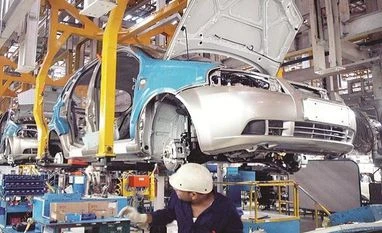Permanent job creation appears to be somewhat missing in the country’s fast-growing and employment-intensive automobile industry. Top automakers are resorting primarily to hiring temporary and contractual staff to meet the rising demand for vehicles across segments.
An analysis of the employee data at the four top auto firms — Maruti Suzuki, Hero MotoCorp, Ashok Leyland, and TVS Motor — shows that less than 4 per cent of the 24,350 additional staff employed at the end of 2017-18 was permanent. Even as they grow, firms want to have flexibility in staff strength since demand often fluctuates.
More than 23,500 new jobs were contractual or temporary and in some cases, the permanent headcount happened to be lower than at the end of 2016-17. Take the instance of the country’s second-biggest commercial vehiclemaker, Ashok Leyland. As of March 2018, the Chennai-headquartered company had 16,802 temporary staff, 81 per cent higher, compared to March 2017. The number of permanent staff, however, came down marginally from 11,906 to 11,835 in the same period, according to the company’s annual reports.
The Hinduja firm earned a record annual profit of Rs 15.63 billion on record revenue of Rs 262.48 billion last year. Units sold were also at a record 174,873.
The company did not respond to queries on the reason behind this sharp surge in temporary staff and details of the wages and benefits available to temporary and permanent employees.
The country’s largest two-wheeler maker, Hero MotoCorp, employed 24,690 temporary or contractual workers as of March 2018, about 53 per cent higher vis-à-vis 16,114 workers a year ago, the data accessed from the annual reports showed. The permanent staff strength increased by less than 200 to 8,266 employees as of March 2018. The firm manufactured and sold a record 7.58 million two-wheelers last year. Queries sent to the company went unanswered.
The country’s third biggest two-wheeler maker, TVS Motor, saw a 41 per cent increase in headcount of temporary/contractual staff as of March 2018 to 10,297. The number of permanent employees, however, decreased about 1 per cent to 5,184.
Suzuki-controlled carmaker, Maruti Suzuki, which sells every second car in the country, employed over 17,000 contractual and temporary staff, including student trainees as of March 2018. This is an increase of about 35 per cent, compared to March 2017. The headcount of permanent or regular staff at the country’s most valued auto firm went up by over 5 per cent to 14,940 employees as of March 2018.
R C Bhargava, chairman at the carmaker, said the ratio of regular workers does not change significantly at the production areas of the plant. “It is usually the work at the non-production area such as loading and unloading of raw material and vehicles, cleaning and security, etc which gets done by the contractual staff. He said though there is not much difference between the wages of a regular and non-regular employee, the regular ones have a longer service record and therefore, enjoy some additional benefits,” he said.
The company had witnessed a violent protest led largely by contractual workers at the Manesar plant in 2012 that resulted in loss of life of a human resource executive and left several officials injured. The plant had to be shut down temporarily. The contractual staff now gets more benefits than they used to enjoy few years ago. Kuldeep Jhangu, general-secretary at the Maruti Udyog Kamgar Union, said the work duration of a temporary staff is seven months, while that of a contractual employee is a year. “A further employment depends on the company’s requirement and the performance and conduct of the staff,” he said. The temporary staff enjoys benefits like provident fund, canteen food, uniform, and bonus as well.
An industry executive said the automobile industry has always witnessed swings in demand. “The difference in demand between the peak season and the low season could be as much as 30 per cent. Automobile companies, therefore, require the flexibility in workforce to be able to cope with such significant seasonality and cyclicality,” he added
Unlock 30+ premium stories daily hand-picked by our editors, across devices on browser and app.
Pick your 5 favourite companies, get a daily email with all news updates on them.
Full access to our intuitive epaper - clip, save, share articles from any device; newspaper archives from 2006.
Preferential invites to Business Standard events.
Curated newsletters on markets, personal finance, policy & politics, start-ups, technology, and more.
)